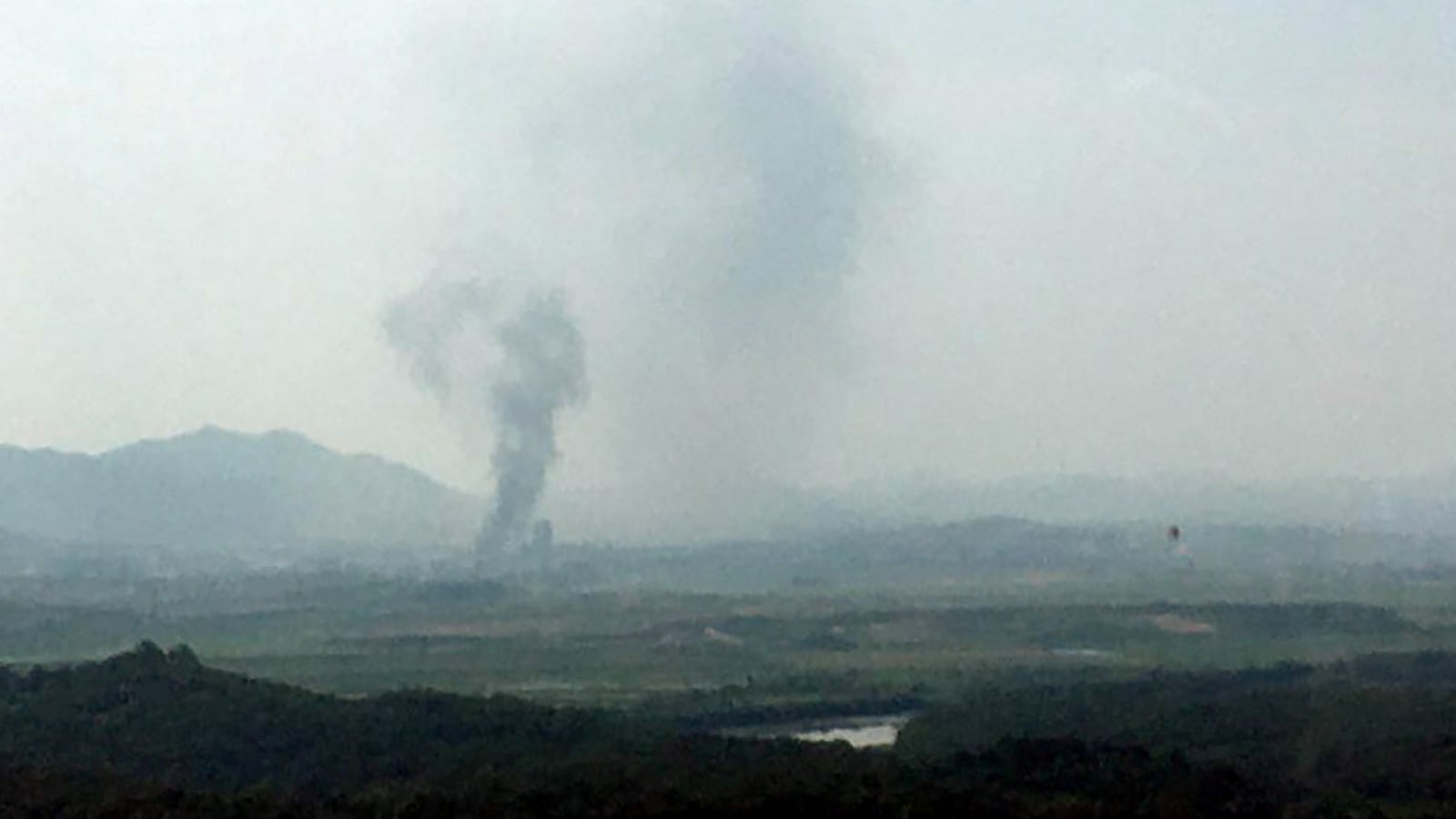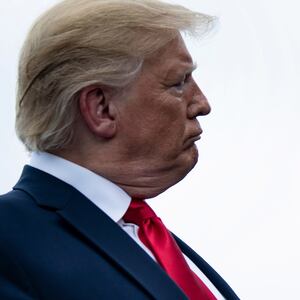SEOUL—U.S. President Donald Trump is so fixated on protests sweeping the U.S. and his plans for razzle-dazzle campaign rallies that he seems oblivious to the scary turn of events in the land he claimed to have rescued from nuclear war by sucking up to North Korea's despot.
While Trump has been absorbed elsewhere, Kim Jong Un on Tuesday literally blew up the glistening liaison office in the Kaesong Industrial Complex the South Koreans had built for cozy tête-à-têtes resolving differences with their North Korean counterparts. North Korean troops took over the zone despite entreaties from South Korea’s President Moon Jae-in. The despot’s high-profile sister, Kim Yo Jong, had earlier denounced “the useless North-South joint liaison office.”
Smoke from the building was visible across the line in South Korea, and the sound of the blast was audible several miles away. North Korea state radio said the building was “tragically ruined by a terrific explosion.”
South Korea was both angered and worried by what appeared as the death knell for whatever was left of a peace process. "We sternly warn we will strongly respond if North Korea takes any action that further worsens the situation," said an official with Moon's national security office after an emergency session.
“The North Korean leaders”—Kim, his sister and those closest to them—“have concluded Trump is not going to win reelection,” says Shim Jae-hoon, long-time analyst for Yale Global, “so in the short window between now and November they want to saber-rattle as much as possible to press him to make concessions.”
“North Korea wants to maintain control of escalation and avoid a large-scale conflict,” said Dan Pinkston, professor at Troy University here. “The North Koreans will continue to see what concessions they can get from the South and/or the U.S. through coercion… Buckle up.”
The North’s aggressive action added teeth to a torrent of invective, much of it from Kim Yo Jong, leading the charge against the South in ostensible retaliation for a barrage of balloons bearing anti-North leaflets wafting over the North Korean countryside. The leaflets bare the excesses of the Kim ruling family along with denunciations of the North’s nuclear and missile program for sapping vital funds needed to feed the country’s hungry, impoverished people.
The policy-makers up in Pyongyang were totally unimpressed by South Korean pledges to close down the leaflet campaign, which the North’s leading paper Rodong Sinmun blasted as “merely a measure to escape from crisis.” The paper pledged in an orgy of rhetoric before the blow-up of the liaison office that “the world shall see how our people will give a lightning strike on south [sic] Korean authorities as punishment and exterminate these scums.”
Of course, there’s a considerable gap between the demolition of a single building and the extermination of “scums,” but Pyongyang appears to be leaving the door wide open to escalation.
South Korean officials, from Moon on down, hardly knew how to respond beyond bland pleas to honor previous commitments. Moon, speaking on Monday with what he said was “a heavy heart,” expressed his hope North and South would “not stop the current inter-Korean relations again.” Having overcome “a long-time severance and the crisis of a war,” he said, “we cannot wait any more for the conditions to improve.”
Both the Pentagon and South Korea’s defense ministry promised to remain ready for any military moves by North Korea, but they were totally helpless to stop North Korean troops from taking over the Kaesong complex 40 miles north of Seoul above the North-South dividing line on the western side of the Korean peninsula. Nor would they be able to stop North Korean troops from reoccupying several guard posts that they had given up on their side of the demilitarized zone in a show of goodwill when Moon also shut down guard posts on the South Korean side.
All this comes in the wake of statement Friday by North Korea’s foreign minister, Ro Son Gwon, marking the second anniversary of the Singapore summit, when he said flatly that “personal relations between our Supreme leadership” and “the U.S. President” were pretty well over.
Trump appeared oblivious to this rude rebuff from the man with whom he had once professed in a flight of fancy to have fallen “in love,” but North Korea appears determined to get his attention if not his affection.
“North Korea has decided the nuclear issue is strictly between them and the U.S.,” said the veteran analyst Shim Jae-hoon. The atmospheric summits between Trump and Kim—first on June 12, 2018, in Singapore, then at the end of February 2019 in Hanoi and, finally, an impromptu session between Trump and Kim four months later at Panmunjom at which the two clasped hands on the line—got nowhere in the process of denuclearization. But the prestige that accrued to Kim from such one-on-one summitry was considerable
The North’s desires are well known—an end to sanctions, reduction in the number of U.S. troops in South Korea, now standing at 28,500, and marked decrease in Washington’s support for the Moon government.
“To achieve these objectives, Kim wants to raise tensions,” said Shim. “He knows he cannot expect a full-scale war without blowback, but he is going to resort to provocations.” As a dramatic example from the past, Shim cited the torpedo attack on the South Korean navy corvette the Cheonan 12 years ago in which 46 South Korean sailors died.
Other scenarios include a possible launch of an intercontinental ballistic missile or a submarine launched ballistic missile and another nuclear test. The last one was conducted by North Korea in September 2017 .
But is Trump concerned about any of this? “Trump right now could care less about Korea,” said Tom Coyner, a long-time business consultant here. That is, he added, “unless something explodes in his lap.”
North Korean planners are well aware that Trump’s concerns lie elsewhere, Coyner observed, “so one may argue the timing may be excellent for a military provocation.” But then again, “these planners must also be considering that Trump may respond in a ham-handed manner to deflect Americans’ focus from domestic issues to Korea.”
A South Korean businessman had some pointed advice for Trump: Come here and test the atmosphere within range of North Korea’s heavy guns.
“For Trump to know how serious the situation is in Korea, he needs to live in Seoul,” said Michael Kim.







